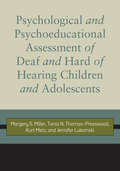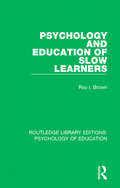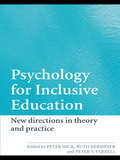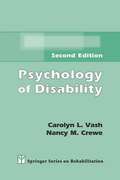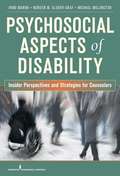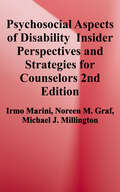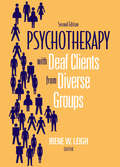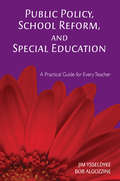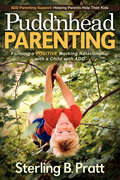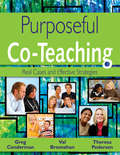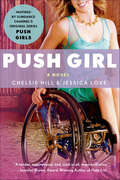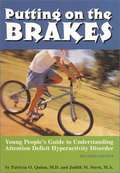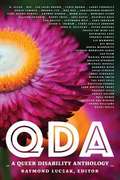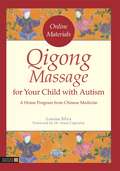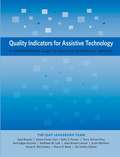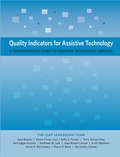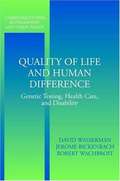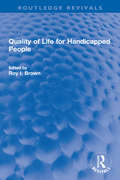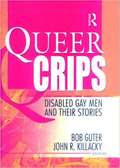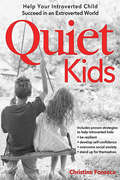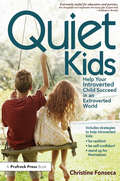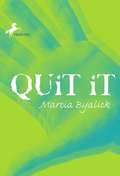- Table View
- List View
Psychological and Psychoeducational Assessment of Deaf and Hard of Hearing Children and Adolescents
by Kurt Metz Tania N. Thomas-Presswood Jennifer Lukomski Margery S. MillerThe obstacles to valid and meaningful assessment of deaf and hard of hearing children and adolescents are great, yet professionals are regularly asked to conduct comprehensive evaluations to determine resource and program eligibility, test modifications in school, classroom and home recommendations, and referrals. In this important new text, the authors define the skills required of the examiners, explain the complex nature of these assessments, and describe ways to intelligently use existing tests. Authors Margery S. Miller, Tania Thomas-Presswood, Kurt Metz, and Jennifer Lukomski bring a wealth of knowledge and experience to this in-depth treatment of topics essential to educators and school psychologists. They cover such critical areas as test construction and measurement; the diversity in American Deaf culture; the role of parents in the assessment process; neuropsychological assessments; nonverbal methods for assessing intelligence; and the need for sign language competency when testing cognitive and language skills. The text concludes with recommendations for the development of valid and reliable tests for all students who are deaf and hard of hearing.
Psychology and Education of Slow Learners (Routledge Library Editions: Psychology of Education)
by Roy I. BrownOriginally published in 1976, this introductory text for those intending to work with slow learners was concerned with the practical implications of recent British and North American research in the field of psychology and education at the time. Slow learners are young people who for a variety of reasons, continuously or for long periods, under-function in terms of intelligence, educational attainment and social skills. This book offers a clear analysis of the problems facing slow learners, their psychology and the types of education open to them. Dr Brown reassesses the needs of disabled children and adults in the context of their families, with the emphasis on the practical level of activity and training possible for them. The aim is the integration of the disabled person in society, and the belief is that services for the disabled should be integrated, with no professional person working on an isolated basis, but as part of a multidisciplinary professional team. Design for individuals entering the field of teaching, particularly those concerned with special education, training and rehabilitation programmes, the book should also be of value to social workers, psychologists and other professional people working in the field, as well as to parents of disabled children.
Psychology for Inclusive Education: New Directions in Theory and Practice
by Ruth Kershner Peter Hick Peter T. FarrellWhat can psychology offer inclusive education? Traditionally, special education has looked to psychology for many of its theoretical resources and practical strategies. While those seeking to promote more inclusive education have tended to see psychology and psychologists as part of the problem by providing a rationale for segregation. However, in practice many psychologists today are developing inclusive ways of working, and are paying attention to psychological theories that underpin inclusive education. Psychology for Inclusive Education reframes the contribution of psychology in terms of its relevance to inclusion and will show how psychological theories of learning and human development are compatible with inclusive education. Part 1 explores psychological theories relevant to understanding inclusive education and Part 2 looks at how psychology can contribute to promoting more inclusive education in practice. Chapters cover: how psychologists can collaborate with teachers for inclusive solutions Vygotsky's theories of learning and their significance for inclusion the challenge of developing pedagogies for inclusion sociocultural understandings of learning in inclusive classrooms the role of emotion in learning and inclusion cooperative learning and inclusion the challenges and tensions of inclusion and high standards for schools the practice of dynamic assessment as an inclusive alternative to IQ social justice and inclusive psychology Bringing together a highly distinguished list of international contributors from the UK, USA and South Africa and including practising educational psychologists, this book will link theory to practice in schools and classrooms. International in focus and at the very cutting edge of the field, this is essential reading for all those interested in the development of inclusive education.
Psychology of Disability (2nd edition)
by Nancy M. Crewe Carolyn L. VashThe latest edition, 20 years after the first, incorporates the many changes that have occurred in disability-related language, legislation, technology, and research. Its two sections focus first on the disability experience a chronicle of what it's like to be disabled and how objective and subjective experiences affect the basic functions of living, working, and playing and then on interventions a response to the problems and sources of psychological pain exposed by the discussions in the first section. Vash (a writer and consulting psychologist in Altadena, Calif. ) and Crewe (Michigan State U. ) see their work as both a textbook or collateral reading source for those studying the psychological aspects of disability, and a general resource for rehabilitation professionals.
Psychosocial Aspects of Disability (Fourth Edition)
by George Henderson Willie V. BryanThis new edition of Psychosocial Aspects of Disability strikes a balance of past, present, and future views of individual, family, societal, and governmental interaction and reaction to persons with disabilities. The past is presented in Part 1, Psychosocial Aspects of Disabilities, in which a view of the evolution of societal reactions to disabilities and persons with disability is presented. This perspective is important because it explains how some of the beliefs and attitudes toward disabilities and those who have a disability have developed. Additionally, Part 1 makes us aware from a historical perspective why persons with disabilities have been subject to certain types of treatment from family, friends, and society. Parts 2 and 3 provide discussion of present situations for persons with disabilities as they move toward better inclusion in society. Chapter 5 discusses the need for empowerment of persons with disabilities and how they can empower themselves. Chapter 6 discusses the need for better employment opportunities for persons with disabilities because this is a significant way of empowering persons with disabilities. Chapter 7 discusses federal legislation that has been developed to facilitate the empowerment of persons with disabilities. Part 4, Psychosocial Issues, to a large extent, represents the future for persons with disabilities. The chapters in this section discuss some disability issues that some persons with disabilities will encounter and/or by which they will be affected during the twenty-first century. Additionally, there is discussion of the need for persons with disabilities to attain the full human rights to which they are entitled.
Psychosocial Aspects of Disability: Insider Perspectives and Counseling Strategies
by Irmo Marini Noreen M. Glover-Graf Michael Jay MillingtonWhat a marvelous and amazing textbook. Drs. Marini, Glover-Graf and Millington have done a remarkable job in the design of this highly unique book, that comprehensively and very thoughtfully addresses the psychosocial aspects of the disability experience. These highly respected scholars have produced a major work that will be a central text in rehabilitation education for years to come. From the Foreword by Michael J. Leahy, Ph. D. , LPC, CRC Office of Rehabilitation and Disability Studies Michigan State University This is an excellent book, but the best parts are the stories of the disabled, which give readers insights into their struggles and triumphs. " Score: 94, 4 Stars--Doody's Medical Reviews What are the differences between individuals with disabilities who flourish as opposed to those who never really adjust after a trauma? How are those born with a disability different from individuals who acquire one later in life? This is the first textbook about the psychosocial aspects of disability to provide students and practitioners of rehabilitation counseling with vivid insight into the experience of living with a disability. It features the first-person narratives of 16 people living with a variety of disabling conditions, which are integrated with sociological and societal perspectives toward disability, and strategies for counseling persons with disabilities. Using a minority model perspective to address disability, the book focuses on historical perspectives, cultural variants regarding disability, myths and misconceptions, the attitudes of special interest and occupational groups, the psychology of disability with a focus on positive psychology, and adjustments to disability by the individual and family. A wealth of counseling guidelines and useful strategies are geared specifically to individual disabilities. Key Features: Contains narratives of people living with blindness, hearing impairments, spinal cord injuries, muscular dystrophy, polio, mental illness, and other disabilities Provides counseling guidelines and strategies specifically geared toward specific disabilities, including "dos and don'ts" Includes psychological and sociological research relating to individual disabilities Discusses ongoing treatment issues and ethical dilemmas for rehabilitation counselors Presents thought-provoking discussion questions in each chapter Authored by prominent professor and researcher who became disabled as a young adult
Psychosocial Aspects of Disability: Insider Perspectives and Strategies for Counselors
by Irmo Marini Michael J. Millington Noreen M. GrafWhat are the differences between individuals with disabilities who flourish and those who never really adjust after a trauma? How do those born with a disability differ from individuals who acquire one later in life? <p><p>Fully updated and revised, this second edition of a unique rehabilitation counseling text reflects growing disparities among "haves" and "have-nots" as they bear on the psychosocial aspects of disability. New content focuses on returning veterans afflicted with physical and mental health problems, persons with disabilities living in poverty, and the need for increased family and community-based engagement. The book provides updated information about assisted suicide, genetic testing, new legislation, and much more. <p><p>Using a minority model perspective, the text provides students and practitioners of rehabilitation and mental health counseling with vivid insight into the experience of living with a disability. It features first-person narratives from people living with a variety of disabling conditions, which are integrated with sociological and societal perspectives toward disability, and strategies for counseling such individuals. The text encompasses a historical perspective, psychological and sociological research, cultural variants regarding disability, myths and misconceptions, the attitudes of special interest and occupational groups, the use of positive psychology, and adjustments to disability by the individual and family. A wealth of counseling guidelines and useful strategies is geared to individuals with specific disabilities. Designed for a 15-week semester, the book also includes thought-provoking discussion questions and exercises.
Psychotherapy With Deaf Clients From Diverse Groups
by Irene W. LeighThe second edition of Psychotherapy with Deaf Clients from Diverse Groups features the introduction of six new chapters that complement full revisions of original chapters with advances in the field since its initial publication. The first part begins with a new chapter on the current ethical issues relevant to working with deaf clients. In subsequent chapters it provides updated information on the diversity of consumer knowledge, attitudes, beliefs, and experiences. Deaf therapists and their involvement in the Deaf community also are scrutinized in this context. The revised second part examines psychotherapy for various constituencies, including deaf women; lesbian, gay, and bisexual deaf populations; children of deaf parents; and people with Usher syndrome. Part Three chapters consider interventions with African American deaf clients, American Indians who are deaf, and Asians who are American and deaf. A new chapter expands information on therapy for Latino deaf clients. The final section incorporates three new chapters on other deaf populations -- deaf college students, recipients of cochlear implants, and deaf elderly clients. Also, new information has been added to chapters on the treatment of deaf survivors of sexual abuse and deaf clients with chemical dependency. The last addition to the second edition outlines dialectical behavior therapy for deaf clients, a valuable option for clinicians.
Public Policy, School Reform, and Special Education: A Practical Guide for Every Teacher
by Bob Algozzine Dr James E. YsseldykeCase studies illustrate how social, political, and economic factors affect special education practices and the distribution of limited resources to students with special needs.
Pudd'nhead Parenting: Forming a Positive Working Relationship with a Child with ADD
by Sterling B. PrattParenting can be worrisome and challenging. If your child struggles with ADD it can be incredibly frustrating and absolutely bewildering. Understanding what is going on inside your child's head is the first step. Helping them understand themselves starts their momentum. You and your child working together in a positive relationship will carry them through to a positive outcome, whatever that is meant to be. Pudd'nhead Parenting addresses the much neglected but critical topic of how to form the right relationship with your child. You can watch them struggle with ADD despite your best efforts, or you can become a positive and supportive influence. Pudd'nhead Parenting teaches you how to employ your best parenting instincts to lift your child out of the quagmire of ADD and help them find direction, learn life skills and go on to become who they really are. Years from now your child will thank you for taking the steps outlined in this book.
Purple Fest 2023 Booklet
by Office of the State Commissioner for Persons with Disabilities GoaThe booklet shines a light on the Purple Fest 2023, India's first-of-its-kind inclusive festival, took place from 6th to 8th January 2023 in Goa. Organized by the Office of the State Commissioner for Persons with Disabilities in association with various government departments, the festival aimed to create a welcoming and inclusive world for everyone. With over 5,000 delegate registrations, including individuals from the disabled community, the event promoted education, respect, and celebration of diversity. The festival featured activities such as Purple Think Tank sessions to empower persons with disabilities, sports events to highlight the need for more opportunities in Para games, Jagruti Mela for interactions with service providers, and Purple Dialogue with experts to develop policies for advocacy at local and national levels. With 1000 local volunteers and 50,000 visitors, Purple Fest showcased the power of inclusivity and the capabilities of individuals with disabilities.
Purposeful Co-Teaching: Real Cases and Effective Strategies
by Gregory J. Conderman Mary V. Bresnahan Theresa PedersenCreate powerful teaching partnerships that promote success for every student in inclusive classrooms! Ideal for both general and special education classrooms, this indispensible resource integrates interpersonal skills, instructional design, and teaching philosophy to guide educators through the beginning stages of co-teaching relationships toward smooth collaboration. The authors provide proven instructional strategies such as visuals, mnemonics, formative assessment, and more, for use within co-teaching partnerships. Additional resources include: Chapter activities and checklists for planning lessons Case studies from various subject areas and grade levels to illustrate the realities of co-teaching Resources such as books, videos, and helpful Web sites
Push Girl: A Novel
by Chelsie Hill Jessica LoveAn inspiring, real, and fresh young adult novel about how life can change in an instant by Chelsie Hill, one of the stars Sundance Channel's series "Push Girls." Kara is a high school junior who's loving life. She's popular, has a great group of friends and an amazing boyfriend, and she's a shoe-in for homecoming queen. Even though her parents can't stop fighting and her ex-boyfriend can't seem to leave her alone, Kara won't let anything get in the way of her perfect year. It's Friday night, and Kara arrives at a party, upset after hearing her parents having another one of their awful fights, and sees another girl with her hands all over her boyfriend. Furious, Kara leaves to take a drive, and, as she's crossing an intersection, a car comes out of nowhere and slams into the driver's side of Kara's car. When Kara wakes up, she has no memory of the night before. Where is she? Why are her parents crying? And, most importantly -- why can't she feel her legs? As Kara is forced to adjust to her new life as a paralyzed teen, where her friends aren't who they seemed to be and her once-adoring boyfriend is mysteriously absent, she starts to realize that what matters in life isn't what happens to you -- it's the choices you make and the people you love. Co-written by "Push Girls" star Chelsie Hill, whose real life inspired Kara's experience, this uplifting novel takes young readers from tragedy to triumph with an unforgettable and unique heroine.
Putting on the Brakes (Revised Edition): Young People's Guide to Understanding Attention Deficit Hyperactivity Disorder
by Patricia O. Quinn Judith M. SternExplains what attention deficit disorder is and how to treat it, discussing the cognitive and emotional aspects, what the medication options are, how to maintain positive relations with friends, and how to do well at school.
QDA: A Queer Disability Anthology
by Raymond LuczakQDA: A Queer Disability Anthology features fiction, poetry, nonfiction, and comics by 48 writers from around the world.
Qigong Massage for Your Child with Autism: A Home Program from Chinese Medicine
by Anita Cignolini Louisa SilvaQigong massage has been used in China for thousands of years as a means to achieve health and wellbeing, and to treat a wide variety of ailments. This book teaches parents a simple qigong massage programme that has been developed specifically for the needs of children with autism spectrum disorders (ASDs). With step-by-step instructions and an accompanying online content demonstrating the technique in action, this book offers parents clear guidance on how to adopt qigong massage into their child's daily routine successfully. The program is based around a core 15 minute massage that, when performed regularly, has been shown to greatly improve mood and behavior, sleeping patterns, and language and social skills. Also included is information on diet, advice on reading a child's body language during massage, and helpful progress checklists. Qigong massage is the ideal therapy for parents looking for an alternative way to strengthen the mind, body and sensory abilities of their young child with autism aged 6 and under.
Quality Indicators For Assistive Technology: A Comprehensive Guide To Assistive Technology Services
by The QIAT Leadership TeamMore than 6 million children with disabilities in North America require assistive technology and related services each year in order to participate and succeed in school. This book, Quality Indicators for Assistive Technology, provides an essential guide for assessing a child's needs, choosing and implementing the right technologies and services, and training education professionals in how to optimize learning with these critical tools.
Quality Indicators for Assistive Technology: A Comprehensive Guide to Assistive Technology Services
by Susan Mccloskey Diana Foster Carl Gayl Bowser Jane Edgar Korsten Joan Breslin Larson Joy Smiley Zabala Kathleen Lalk Kelly Fonner Penny Reed Scott Marfilius Terry Vernon FossMore than 6 million children with disabilities in North America require assistive technology and related services each year in order to participate and succeed in school. This book, Quality Indicators for Assistive Technology, provides an essential guide for assessing a child's needs, choosing and implementing the right technologies and services, and training education professionals in how to optimize learning with these critical tools.
Quality of Life and Human Difference: Genetic Testing, Health Care, and Disability
by Jerome Bickenbach David Wasserman Robert WachbroitThis study brings together two important literatures one volume. One concerns the role of quality assessments in social policy, especially health policy. The second concerns ethical and social issues raised by prenatal testing for disability. Hitherto, these two literatures have had little contact with each other: few scholars have written about both, or have compared the two domains in a systematic way, while people with disabilities and disability scholars are underrepresented in recent discussion on health policy and quality of assessment. This book turns the perspectives of disability scholars on issues that have largely been the province of health methodology, policy and philosophy, while angling philosophical policy analysis on problems that have largely been the province of disability scholarship. This volume will be sought after by bioethicists, philosophers, and specialists in disability studies and healthcare economics.
Quality of Life for Handicapped People (Routledge Revivals)
by Roy I. BrownFirst published in 1988, Quality of Life for Handicapped People examines developments and innovations in research and practice concerning the quality of life for those with disabilities. The book centres on the topic of rehabilitation education, with a particular focus on issues relating to quality of life, including what is meant by ‘quality of life’ and the measures and systems required to assess the variables involved. It highlights the significance of rehabilitation education in underlining the key issue of how individuals feel about themselves and how they perceive the services available to them for the purpose of rehabilitation. It considers the importance of environment and the improvement of environment in increasing quality of life, and examines a range of vocational and social programmes from a variety of perspectives. Quality of Life for Handicapped People will be of use to those with an interest in the history and development of rehabilitation education.
Queer Crips: Disabled Gay Men and Their Stories
by John R. Killacky Bob Guterthis is an anthology of essays and short stories about gay men who are also disabled. Many of the stories and essays are taken from Bent, an on-line publication that gives voice to the often silent voices of disabled gay men.
Queer Silence: On Disability and Rhetorical Absence
by J. Logan SmilgesChampioning the liberatory potential of silence to address the fraught disability politics of queernessIn queer culture, silence has been equated with voicelessness, complicity, and even death. Queer Silence insists, however, that silence can be a generative and empowering mode of survival. Triangulating insights from queer studies, disability studies, and rhetorical studies, J. Logan Smilges explores what silence can mean for people whose bodyminds signify more powerfully than their words.Queer Silence begins by historicizing silence&’s negative reputation, beginning with the ways homophile activists rejected medical models pathologizing homosexuality as a disability, resulting in the silencing of disability itself. This silencing was redoubled by HIV/AIDS activism&’s demand for &“out, loud, and proud&” rhetorical activities that saw silence as capitulation.Reading a range of cultural artifacts whose relative silence has failed to attract queer attachment, from anonymous profiles on Grindr to ex-gays to belated gender transitions to disability performance art, Smilges argues for silence&’s critical role in serving the needs of queers who are never named as such. Queer Silence urges queer activists and queer studies scholars to reconcile with their own ableism by acknowledging the liberatory potential of silence, a mode of engagement that disattached queers use every day for resistance, sociality, and survival.Retail e-book files for this title are screen-reader friendly with images accompanied by short alt text and/or extended descriptions. Cover alt text: Background detail of a painting on canvas shows a partial view of the upper body and face of a figure, bearded and naked; title in painted script.
Quiet Kids
by Christine FonsecaBeing an introverted child is difficult, especially in an ever-increasingly noisy world. Often viewed as aloof, unmotivated or conceited, introverted children are deeply misunderstood by parents, educators and even their peers. That's where Quiet Kids: Help Your Introverted Child Succeed in an Extroverted World comes in. Designed to provide parents with a blueprint for not only understanding the nature of introversion, Quiet Kids provides specific strategies to teach their children how to thrive in a world that may not understand them. Presented in an easy-to-read, conversational style, the book uses real-world examples and stories from introverts and parents to show parents and educators how to help children develop resiliency and enhance the positive qualities of being an introvert. With specific strategies to address academic performance, bullying, and resiliency, Quiet Kids is a must read for anyone wishing to enhance the lives of introverted children.
Quiet Kids: Help Your Introverted Child Succeed in an Extroverted World
by Christine FonsecaBeing an introverted child is difficult, especially in an ever-increasingly noisy world. Often viewed as aloof, unmotivated, or conceited, introverted children are deeply misunderstood by parents, educators, and even their peers. That's where Quiet Kids: Help Your Introverted Child Succeed in an Extroverted World comes in. Designed to provide parents with a blueprint for understanding the nature of introversion, Quiet Kids provides specific strategies to teach children how to thrive in a world that may not understand them. Presented in an easy-to-read, conversational style, the book uses real-world examples and stories from introverts and parents to show parents and educators how to help children develop resiliency and enhance the positive qualities of being an introvert. With specific strategies to address academic performance, bullying, and resiliency, Quiet Kids is a must-read for anyone wishing to enhance the lives of introverted children.
Quit It
by Marcia ByalickAt a quick glance, Carrie looks just like everybody else in her seventh-grade class. She gets good grades, acts in school plays, kicks a pretty decent soccer ball, and is a sensational Game Boy champion. But watch her a little longer and Carrie looks very different. She shrugs her shoulder a little too often, jerks her head, coughs and sniffs in uncontrollable bursts. She has Tourette’s syndrome. And at a time when all a kid wants to do is blend in with the crowd, she stands out like crazy. From ...
